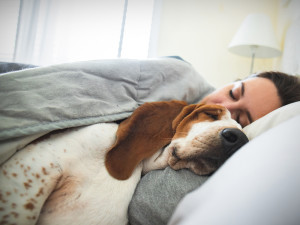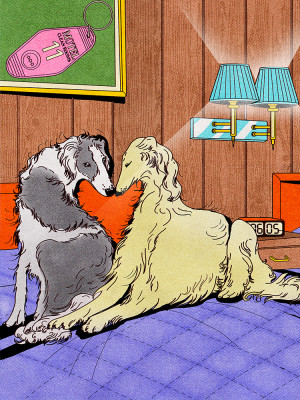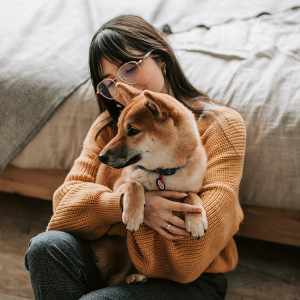I’m a Dog Behaviourist, Here’s When I Would Ban Bed Sharing
The five reasons not to co-sleep with your pup

Share Article
For many of us, sleeping with our dog feels natural. After all, historically dogs would have alerted us to potential dangers so they can make us feel protected. Studiesopens in new tab have even shown we might sleep better with a dog next to us instead of another human. Curling up with your dog at night might feel comforting, it could strengthen your bond, and even help you both relax. But as with most aspects of living alongside dogs, context matters.
As a canine behaviourist, I find my clients can be reluctant to share the fact that their dog sleeps alongside them – or perhaps worry that I will tell them they shouldn’t. While sharing a bed with your dog isn’t inherently bad, there are certain scenarios where it may create problems. That could be that for you, your dog, or sometimes the household dynamic. It’s important we consider the safety aspect of sleeping alongside our dogs, as well as how comfortable they are feeling.
While sleeping alongside your dog can provide a beautiful bonding situation, I want to highlight some of the common situations where it may be best to rethink dog bed sharing – and focus on bonding with your dog at other times of the day.
Resource guarding and bed sharing
One of the most common situations in which sharing your bed with your dog can cause a challenge is when your dog isn’t comfortable sharing the space. This could be that they are inclined to guard the bed itself from any humans – or they might be guarding the bed from a partner, as they do not want to share the space – or you – with anyone else.
Resource guarding may start to appear by your dog stiffening, doing a low growl or physically moving into the space you’re about to take to try and deter you. It can escalate to the dog lunging, snapping or even biting when someone approaches the bed (or even enters the room) at bedtime.
You may find it’s difficult to lure your dog off the bed using treats, or that if you try to move them physically they will become very upset.
Unfortunately, guarding behaviour can escalate fairly quickly – and may appear to ‘come out of nowhere’ if the more subtle signs your dog was communicating with were ignored to start with.
When a dog is protecting the bed from a partner or other family member, such as young children seeking comfort, this can cause challenges for the relationships in the household – as well as being a physical threat.
While allowing your dog to sleep on your bed won’t create guarding tendencies alone – this will come from somewhere else genetically or behaviourally – it can give it more of an opportunity to occur.
If you start to see your dog showing signs of guarding in the bedroom, it is usually time to make a change of sleeping setup. This doesn’t always need to be that your dog has to be excluded from the room altogether, but a good start would be them sleeping in their own space. If your dog has escalated their guarding behaviour it is definitely worth seeking the support of an ethical behaviourist to guide you through the process.
Preparing for a baby
If you are pregnant or preparing to adopt, it’s important to decide where your dog will be sleeping once the child has arrived and to assess the safety of this setup. A baby brings a lot of new experiences for your dog, alongside a reduction in your attention.
Sleep disruptions are massively important to consider. Not only for your dog – as quality sleep and rest is so important for their emotional well-being – but also from a practical perspective. If your dog is sleeping in your room, could you step on them while tired during the eighth wakeup of the night? Could you forget to close their crate door, in a sleep deprive state? Does your dog already shift around a lot, disturbing you, which would be unnecessary extra sleep loss during the early months?
If your dog is used to sleeping in your bed, then it’s important to make a change sooner rather than later. We want the change of sleeping location to be separate from the child’s arrival so they don’t feel ousted as the baby arrives. A sudden change can feel like a loss, potentially creating stress or confusion.
Aim to work on settling your dog either in a new space within your room, such as a crate or a pen – or in a new space altogether in your home – at least 2 or 3 months in advance. Slowly move them from being in your bed, to a bed on the floor – then transition that bed away from your room little by little.
While this can feel sad, like you’re changing life too much for your dog, it’s a safety risk to keep your dog in your room alongside a newborn – especially if you’ll be co-sleeping with them. It also can be kinder to get your dog used to a new room, further away from the bedroom, so that they can rest in peace overnight while you unfortunately are left to the night feeds and nappy changes!
When your sleep quality is suffering
Even though dogs don’t share our circadian rhythms perfectly, their movements, body heat and even loose fur (think allergens) can influence our own comfort and rest. Over time, disrupted sleep can affect your mood, overall health and your ability to be a consistent, patient guardian to your dog.
You might notice that sharing a bed with your dog has become an issue and is affecting your rest if you frequently wake up because of their movements, scratching or shifting positions. It might be they lick their bodies at certain times of the night or even their snoring could be irritating you. Overheating can also become a problem, especially if your dog curls up against you, and this is even more noticeable with large breeds. Allergic reactions such as sneezing, congestion or skin irritation that worsen overnight are also signs that sharing a bed may not be ideal.
From a behavioural standpoint, it’s important to remember that we are the constant for our dogs – if your sleep is being impacted, your mood state might be a little erratic. This might then impact your dog’s overall mood, too, as you find it harder to respond calmly or train them effectively.
If their heat or movement is disturbing your rest, you could place a dog bed on the floor next to yours, giving your dog closeness without constant disruption. For allergies, you might try solutions such as using a High-Efficiency Particulate Air (HEPA) filter, grooming your dog more frequently, or not letting your dog onto your bedding. Moving your dog out of your bed doesn’t mean losing closeness – and while many dogs settle happily in the same room, which can maintain comfort for both of you, just as many can also sleep well in another part of the home.
When anxiety or hypervigilance is reinforced
For many dogs, sharing a bed with their human is a source of comfort. But for others, particularly those prone to separation anxiety or hypervigilance, co-sleeping can turn into a coping mechanism that reinforces underlying behavioural issues. Usually, I wouldn’t combine sleeping alongside your dog as a contributing factor to separation related challenges, but there are times where it could be a part of the picture.
Signs anxiety may be driving the behaviour include a dog struggling to sleep if you leave the room – for example to use the bathroom – growling or pushing between you and a partner at night, or restless pacing until they are invited into bed.
There is an important distinction between healthy comfort-seeking and dependency. If a dog cannot settle unless they are in your bed, it suggests there could be some hyper-attachment issues. Left unaddressed, this reliance might also spill into the daytime, making it harder for your dog to build independence and cope when alone.
It’s important to get the support of a positive canine behaviourist to help support your dog in building their solo confidence.
When health concerns arise
Most of the time, dog and human can share a bed quite comfortably together, but there are times when it’s not ideal for the physical health of either dog or human. Whether it’s due to illness, recovery or vulnerability, both humans and dogs may need sleep separation at certain points.
For the human end of the lead, immunocompromised individuals may face risks from zoonotic diseases or parasites. Respiratory issues like asthma may worsen from overnight exposure to dander.
For our dogs, post-surgery recovery often requires restricted movement. Dogs with skin conditions or parasite infestations may need their own space while being treated.
Having some flexibility in where your dog settles at night can mean that they’re more adaptable top change when required. That being said, many dogs can cope with temporary separation and changes to nighttime routines if introduced carefully.
Having a predictable evening routine may help, with a specific order of events occurring before bed. Having a cue and a treat placed onto the sleeping spot you want your dog to take that night can also be a visual way to show your dog what’s expected.
If nighttime routines need to change somewhat, then keeping the daytime as continuous as possible can help. It ensures that your dog feels secure in your relationship, even if sleeping arrangements change.

Caroline Wilkinson
Caroline Wilkinson is a Certified Animal Behaviourist. As the Founder of digital pet coaching service Barket Place, Caroline has a passion for improving connections between human and hound, with a focus on relationships and reduction of stress for canines living in a human world.
Related articles
![Woman and dog sleeping together in bed]()
Where Should Your Dog Sleep At Night-Time?
It’s a personal preference, but here are the pros and cons
![An illustration of 2 dogs on a bed]()
Three’s a Crowd: When One Partner Doesn’t Want the Dog in the Bed
You want them to cuddle up; your partner doesn’t. Here’s how to handle the great bed debate
![Dog laying on the ground guarding toy in mouth]()
How to Get Your Dog to Stop Resource Guarding Their Stuff
If your dog growls when you get near their food or toys, read this right now
![A woman wearing a knit sweater holding a dog close on the floor of her bedroom.]()
Separation Anxiety in Dogs
Train your dog to stay calm when they’re on their own – instead of sad-singing “All By Myself” until you come home.




